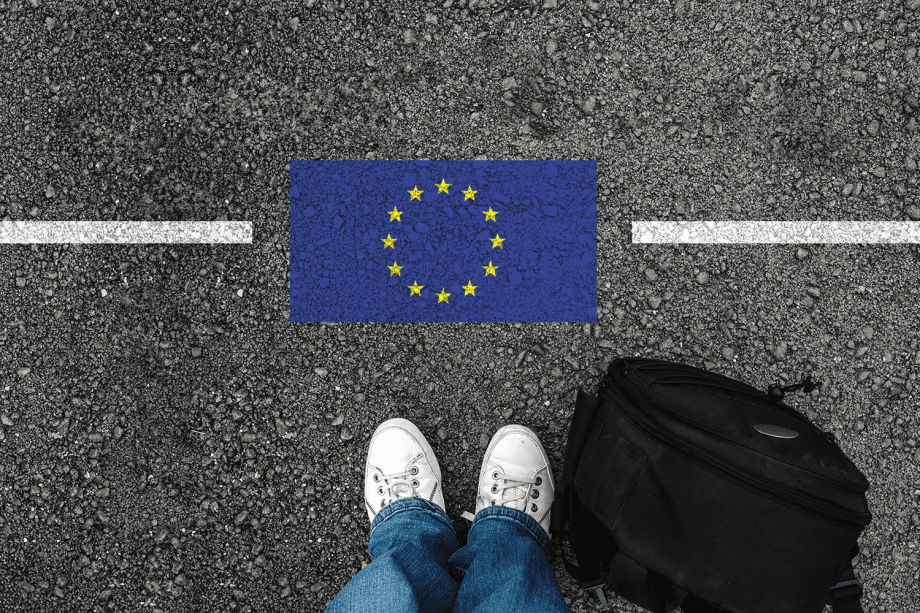Return to borderless Europe after COVID-19 will be difficult but not impossible

If we do not start creating conditions for the return to a border-free Schengen zone now, the temporary measures introduced to control the spread of the COVID-19 pandemic risk becoming permanent writes Alena Kudzko.
Contemplating the opening of borders in Europe today will earn you a “what a lunatic” label. Just as COVID-19 can be exacerbated through underlying health problems, the European free-movement zone’s own pre-existing conditions put it at great risk.
Before the coronavirus scare, there was already any number of motivating factors for European countries to reintroduce borders – migration flows, terrorism and cross-border crime, and the Europe-wide inward-looking tendency to seek national solutions.
These inclinations will only get worse with COVID-19. If these issues continue to be left unattended, we will have a Europe (and an entire world) where borders are more stringent and more persistent than what we are used to.
The first factor on everyone’s agenda today is COVID-19. No one knows how long it will take to combat this pandemic and what lingering effects it will have on societies. But regardless of how long it takes to contain the coronavirus, there will always be the threat of another pandemic on the horizon.
Given the lack of vaccines for newly emerging viruses, border and travel controls are likely to continue to be seen as a means of controlling the spread of infections.
Second, it was migration what initially brought back internal border checks to the Schengen zone, albeit randomized and limited in scale.
Following the 2015 migration crisis, six European countries introduced some level of border controls – Germany, Austria, Denmark, Sweden, France, and Norway. Though the number of asylum applications has more than halved since 2015, border checks have remained in place despite their questionable legality under Schengen regulations.
If the recent relatively low numbers were not convincing enough for countries to lift border checks entirely, it will be even more difficult to return to a seamless Schengen in a context where there are likely to be persistent waves of migration to Europe from the Middle East and sub-Saharan Africa.
Third, the future of open borders has been an integral element of discussions about the threat of terrorism in Europe following attacks in Paris in 2015 and Brussels in 2016. Both attacks happened against the backdrop of long-term cooperation between jihadi networks in France and Belgium and the lack of proper coordination between governments in European countries.
Fourth, compounding the pandemic, migration, and terrorism concerns, nationalist and anti-globalisation sentiment have all been growing in Europe (and elsewhere) for years. “Regaining border control” has been a popular narrative in recent years. Now that Europe is suffering from the coronavirus pandemic, these inclinations are being further bolstered.
Far-right politicians in several European countries had, in fact, already demanded the reintroduction of border controls to protect domestic populations from the spread of the coronavirus during the early stages of the epidemic.
Arguments have also been put forward linking migration to the spread of disease, including by incumbent governments – be it in Greece, Hungary, or earlier in Poland. This rhetoric is unlikely to dampen following a period of extreme disruption to public life and the economy and a death toll numbering in thousands.
In light of this public rhetoric, governments may be tempted to maintain certain border measures post-COVID-19 regardless of the objective situation on the ground to send a signal to domestic populations that they are in control.
It will take a concerted effort and robust measures to overcome this quartet of fears.
The public will be offered difficult choices: security, including health, versus the economy and freedom. People will likely choose the former – unless we step up our game and demonstrate that the choices are not binary and that the benefits of free border zones can ameliorate the apprehensions that people might hold.
Combatting pandemics will require global cooperation. Internal cooperation between security stakeholders should be further improved to prevent terrorist attacks. And it would be prudent for EU members to reinvest in initiatives to form a truly common migration system in addition to external measures that seek to alleviate problems in the countries of origin of migrants.
Finally, once the current wave of infections has flattened and receded, Schengen countries must collectively lift border controls in compliance with Schengen regulations.
It will feel like a leap of faith coming after what is likely to be months of trauma. But if done in coordination, it will enable the benefits of free movement to rapidly accrue again, improve confidence, prevent erosion of the Schengen system, and restore the credibility of the European project.
This article was originally published on the EURACTIVE.COM website on 31 March 2020.
This article is published within GLOSBEC DIFF GOV — European Governance: Potential of Differentiated Cooperation project supported by Jean Monnet Actions of the EU’s Erasmus+ program.
The European Commission support for the production of this publication does not constitute an endorsement of the content, which reflects the views only of the authors, and the Commission cannot be held responsible for any use which may be made of the information contained therein.
